Top 10 Most Influential Leaders of the 20th Century
 Sir Winston Leonard Spencer-Churchill was a British statesman who was the Prime Minister of the United Kingdom from 1940 to 1945 and again from 1951 to 1955. Churchill was also an officer in the British Army, a historian, and a writer.
Sir Winston Leonard Spencer-Churchill was a British statesman who was the Prime Minister of the United Kingdom from 1940 to 1945 and again from 1951 to 1955. Churchill was also an officer in the British Army, a historian, and a writer. Gandhi, Hitler, Ataturk? As an American of German ancestry, it pains me to say a Brit was probably not only the most influential, but arguably the greatest man to walk the earth, short of Christ himself.
In the face of certain doom, this man led his country to stand up, fight, and oppose the most formidable force the world had ever seen. He walked among his people as the bombs were falling. Courage, strength, integrity, sincerity, and the deepest conviction gave him the moral authority to lead a nation and the world from the brink of enslavement.
Hitler before Churchill? What a joke. A brutal coward and a thug. He murdered a lot of people, but last I checked, the universal language is English, not German, and the symbol of his reign isn't even legal in his own nation.
By the way, all you FDR fans, nope. Roosevelt did not have the courage to lead his people to do what was right over what was popular. As the Jewish peoples of Europe were being written out of the future, his buddy Joe Kennedy, the same man who gave us Jack, Bob, and Ed, and the British ambassador, was telling the President that the anti-Nazi rants were Jewish propaganda. FDR nearly let the clock run out and stood by as country after country folded to this thug.
Churchill all the way. Thank you, Churchill, and thank you, England, for holding off the collapse while the rest of us considered the cost.

At the beginning of the 20th century, while every leader was leading people either to fascism or communism, he was the only leader who had the vision of establishing a republic and democracy. He tried so hard to convince even his comrades to believe in democracy and universal values. His vision was so ahead of his time that it allowed Turkish women to gain the right to vote and be elected, while it was a dream in Europe.
In the middle of an Islamic community, he tried to implement a modern lifestyle. A scientific education system, a deficit-free economy, and a secular government legacy. His revolution was the only revolution in the 20th century that established a modern republic, unlike the communist and fascist ones.
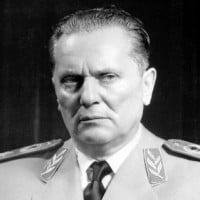 Josip Broz (7 May 1892, Kumrovec – 4 May 1980, Ljubljana), commonly known as Tito, was a Yugoslav communist revolutionary and statesman, serving in various roles until his death in 1980. During World War II he was the leader of the Partisans, often regarded as the most effective resistance movement... read more
Josip Broz (7 May 1892, Kumrovec – 4 May 1980, Ljubljana), commonly known as Tito, was a Yugoslav communist revolutionary and statesman, serving in various roles until his death in 1980. During World War II he was the leader of the Partisans, often regarded as the most effective resistance movement... read more In 1980, he had the largest state funeral in history.
This man, who seems unknown to many, was loved by leaders from both sides of the Cold War. His death brought enemies together in silent mourning, but it also marked the end of an era of brotherhood and unity.
Tito was the greatest leader of the 20th century because his influence stretched out to a global scale. However, he is also considered the worst leader because nobody could possibly live up to his greatness.
He fought off Hitler, humiliated Stalin, and resisted pressure from the United States. He had a vision of what he believed was right and didn't allow anyone to halt his journey.
People talk about Lenin or Marx as the socialist revolutionaries, but they are wrong. Tito was the true revolutionary. By taking elements from many different ideologies, he was able to create a truly socialist nation that strived for the people, and not for military or economic dominance. It wasn't about controlling the most land or having the largest industrial base, as was the case in the US or USSR, but about giving the people what they deserved.
In short, this man was highly decorated and loved by most of the world. His status as a wartime leader, his very resistance to Stalin, and his key role in founding the Non-Aligned Movement propel Tito into being the most influential leader of the 20th century. No question.
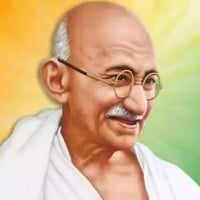
I think that Mr. Gandhi was and still is one of the most influential persons that the human race has ever known in this contemporary world. Be it his character, devotion, integrity, vision, patience, peace-making ability, philosophy, humbleness, or simplicity. And if I continue to enumerate, there won't be enough words to define the exemplary person he was. He was second to none, and I do not believe that there will be another living man who can reach his achievements.
Mahatma Gandhi popularized non-violent forms of protest around the world with his famous Salt March, as well as other forms of resistance such as Satyagraha and Ahimsa. He worked within the Indian National Congress alongside figures like Jawaharlal Nehru and frequently corresponded with leaders like Leo Tolstoy. Gandhi inspired many global figures, including Nelson Mandela and Martin Luther King Jr.
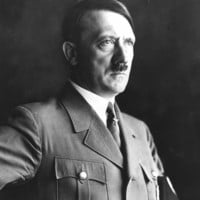 Adolf Hitler (April 20, 1889 - April 30, 1945) was a German politician of Austrian descent who served as the leader of the Nazi Party since 1921, Chancellor of Germany since 1933, and Führer of Nazi Germany since 1934. As dictator of Nazi Germany, he reversed the Treaty of Versailles, initiated World... read more
Adolf Hitler (April 20, 1889 - April 30, 1945) was a German politician of Austrian descent who served as the leader of the Nazi Party since 1921, Chancellor of Germany since 1933, and Führer of Nazi Germany since 1934. As dictator of Nazi Germany, he reversed the Treaty of Versailles, initiated World... read more Personally, I believe Hitler is the greatest leader in the 20th Century. His commitment was extraordinary. He used all his skills to reach his aim and invented knowledge and industry to implement his aim. He created a mission based on a philosophy and practically executed that mission. He mobilized the entire nation to contribute to that mission. In this course, Hitler used all the resources around him to reach his aim. He invented many resources that were not freely available and managed those resources efficiently and effectively. He gave high technical and disciplinary values to his work. I think Hitler used all the human distinctiveness and strengths that a human being can use to reach his aim or long-felt inner-human urges.
(I know the entire world hates Hitler, and so do I, but I highly respect his leadership. How he used his leadership is a different story.)
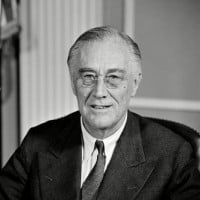 Franklin Delano Roosevelt, commonly known as FDR, was an American statesman and political leader who served as the 32nd President of the United States from 1933 to 1945. A Democrat, he won a record four presidential elections and dominated his party for many years as a central figure in world events... read more
Franklin Delano Roosevelt, commonly known as FDR, was an American statesman and political leader who served as the 32nd President of the United States from 1933 to 1945. A Democrat, he won a record four presidential elections and dominated his party for many years as a central figure in world events... read more Clearly the best President the United States had from the '30s to the mid-'40s. His economic strategies were instrumental in helping the US recover from the Great Depression. He transformed America into a superpower. However, he was similar to Woodrow Wilson in that he declared war - WWI for Wilson and WWII for FDR. His introduction of Japanese Internment camps, where people of Japanese descent underwent heavy scrutiny, is a significant flaw. FDR's legacy remains unpopular but important.
Led America out of the Great Depression and won four terms as President during incredibly challenging economic times, while fighting WWII.
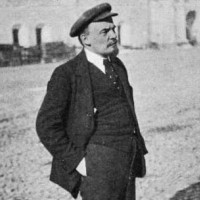 Vladimir Ilyich Ulyanov (22 April 1870–21 January 1924), better known as Vladimir Lenin, was a Russian revolutionary, politician, and political theorist. He served as the first and founding head of government of Soviet Russia from 1917 to 1924 and of the Soviet Union from 1922 to 1924. Under his administration,... read more
Vladimir Ilyich Ulyanov (22 April 1870–21 January 1924), better known as Vladimir Lenin, was a Russian revolutionary, politician, and political theorist. He served as the first and founding head of government of Soviet Russia from 1917 to 1924 and of the Soviet Union from 1922 to 1924. Under his administration,... read more Vladimir Lenin, the leader of the Bolsheviks during the Russian Revolution, was one of the most influential figures of the 20th century. He was largely responsible for overthrowing the unjust and greedy line of Russian Tsars, founding the nation that was the primary victor in World War II, and opposing the United States in the Cold War. Without Lenin, the world would have been a very different place.
It takes a smart man to make something bigger and better. But it takes a genius, like Vladimir Lenin, to make an idea turn the other way. He gave Russia all he had. And he did something no other man in history did. He made something so revolutionary that the world will always remember Communism.
 Martin Luther King Jr. (born Michael King Jr.; January 15, 1929 – April 4, 1968) was an African American minister and activist who became the most visible spokesperson and leader in the civil rights movement from 1955 until his assassination in 1968. King is best known for advancing civil rights through... read more
Martin Luther King Jr. (born Michael King Jr.; January 15, 1929 – April 4, 1968) was an African American minister and activist who became the most visible spokesperson and leader in the civil rights movement from 1955 until his assassination in 1968. King is best known for advancing civil rights through... read more Probably one of the greatest American citizens ever, along with his wife Coretta Scott King, if not the greatest of all time. He helped advance Civil Rights in both Republican (Eisenhower) and Democrat (Kennedy/Johnson) Administrations. This advancement helped to desegregate schools, but also advance voting rights, and prohibit discrimination in many areas such as employment and housing, which were major parts of the Great Society/War on Poverty programs proposed by LBJ. He also marched for other causes, such as the Poor Man's March on Washington, and his family still advocates through the King Center to help advance equal justice for all.
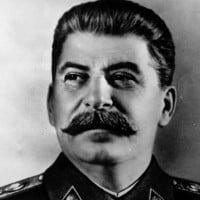 Joseph Vissarionovich Stalin was a Georgian dictator, and was the leader of the Soviet Union from the mid-1920s until his death in 1953. Holding the post of the General Secretary of the Central Committee of the Communist Party of the Soviet Union, he was effectively the dictator of the state.
Joseph Vissarionovich Stalin was a Georgian dictator, and was the leader of the Soviet Union from the mid-1920s until his death in 1953. Holding the post of the General Secretary of the Central Committee of the Communist Party of the Soviet Union, he was effectively the dictator of the state. Joseph Stalin is considered the best leader of the USSR if we stop viewing him through the lens of Western liberal democracy. His brutality is highly controversial, with different historians always presenting varying accounts and events about his leadership. They are not even at a consensus. However, if some brutality occurred during his regime, it might have been a mechanism of socialism. In 2000, Russia revealed papers suggesting that Stalin only wanted to maintain the socialist structure.
Joseph Stalin was Hitler's nightmare. He transformed Russia from a weak agricultural nation into an industrial superpower. Although he did kill millions, more than Hitler, he made the Soviet Ruble worth more than the US dollar. Employment was guaranteed, free healthcare was provided, injured workers were guaranteed pay, and the state regulated food prices, among many other achievements.
 Nelson Rolihlahla Mandela (18 July 1918 – 5 December 2013) was a South African anti-apartheid activist who served as the first president of South Africa from 1994 to 1999. He was the country's first black head of state and the first elected in a fully representative democratic election. His government... read more
Nelson Rolihlahla Mandela (18 July 1918 – 5 December 2013) was a South African anti-apartheid activist who served as the first president of South Africa from 1994 to 1999. He was the country's first black head of state and the first elected in a fully representative democratic election. His government... read more I think Nelson Mandela is the best. Although Africa is a continent, not a country, he significantly contributed to peace across the continent.
Great leader for peace, even towards those who persecuted him. An excellent example for mankind.
He is/was the utopia in terms of humanity! The greatest connector and leader for peace and equality.
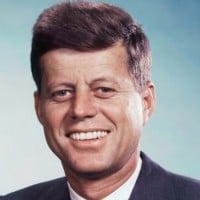 John Fitzgerald Kennedy (May 29th, 1917 - November 22, 1963) commonly referred to by his initials JFK, was an American politician who served as the 35th President of the United States from January 1961 until his assassination. The Cuban Missile Crisis, The Bay of Pigs Invasion, the Nuclear Test Ban... read more
John Fitzgerald Kennedy (May 29th, 1917 - November 22, 1963) commonly referred to by his initials JFK, was an American politician who served as the 35th President of the United States from January 1961 until his assassination. The Cuban Missile Crisis, The Bay of Pigs Invasion, the Nuclear Test Ban... read more He risked and lost his life by courageously attempting to take on the power elites through his decision to shut down the corruption of the Federal Reserve. This would have had a huge positive effect on the world by making an incredibly positive shift in the direction of the financial evolution of the planet.
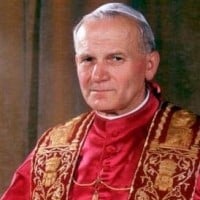 Pope John Paul II served as Pope and sovereign of the Vatican City State from 1978 to 2005. He is called Saint John Paul the Great by some Catholics.
Pope John Paul II served as Pope and sovereign of the Vatican City State from 1978 to 2005. He is called Saint John Paul the Great by some Catholics. He helped free Poland, supported Mother Teresa, forgave the man who shot him, and believed in people standing side by side, hand in hand, in peace. He even cured a woman with cancer. Did Gandhi do that? No! And why is Margaret Thatcher on the list? She discriminated against Catholics in my country, Ireland. She let Bobby Sands and the hunger strikers die, even though the Pope tried to stop the British government from doing so and to give us a united Ireland. He is now in heaven, enjoying himself. Long live the memory of Pope John Paul II.
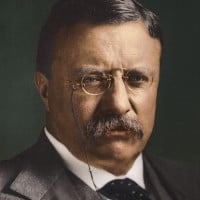 Theodore Roosevelt was an American statesman, author, explorer, soldier, naturalist, and reformer who served as the 26th President of the United States from 1901 to 1909. As a leader of the Republican Party during this time, he became a driving force for the Progressive Era in the United States in the... read more
Theodore Roosevelt was an American statesman, author, explorer, soldier, naturalist, and reformer who served as the 26th President of the United States from 1901 to 1909. As a leader of the Republican Party during this time, he became a driving force for the Progressive Era in the United States in the... read more He shaped the United States and the world as both proceeded into the 20th century. He was far ahead of his time, being both tough yet compassionate. Extremely intelligent, hardworking, humble, and a wonderful father and husband, he was probably the most idealistic and honorable leader we've ever had, and his enthusiasm knew no bounds.
A man with ideas that were ahead of his time. A tough man with liberal ideas. Anti-trust laws, child labor laws, national parks. The greatest American president by far.

This man could not win the love of his own people. Ask people on the street in Russia who the worst leader in the history of Russia is, and 8 out of 10 will name Gorbachev (the rest will name Yeltsin). The people did not forgive him for destroying the Soviet Union and plunging the country into chaos, poverty, and banditry, which came after the greatest robbery in history.
In the 30 years since then, Russia has evolved from a developed industrial superpower into what is now called the capacious name "Nigeria with Snow." Some say it's not his fault, but the reality is that it was the result of his actions. China, being much less developed than the USSR in the early 90s, was able to successfully implement perestroika, and now look what it has become. The Soviet Union would have been in its place...
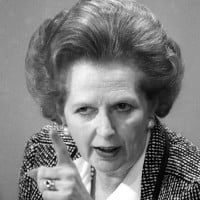 Margaret Hilda Thatcher, Baroness Thatcher, was a British stateswoman and politician who was the Prime Minister of the United Kingdom from 1979 to 1990 and the Leader of the Conservative Party from 1975 to 1990. She was the longest-serving British Prime Minister of the 20th century and was the first... read more
Margaret Hilda Thatcher, Baroness Thatcher, was a British stateswoman and politician who was the Prime Minister of the United Kingdom from 1979 to 1990 and the Leader of the Conservative Party from 1975 to 1990. She was the longest-serving British Prime Minister of the 20th century and was the first... read more Margaret Thatcher did not try to destroy the working class. She cut spending, entitlements, and welfare, which were debilitating the growth of private capitalism in Britain and killing jobs. She was trying to inspire the work ethic within the British people, encouraging them to rely on themselves rather than expecting the government to take care of them. Britain was a stagnant economy at the time.
Thatcher instilled policies that brought freedom, free trade, and job growth. It took time, as it does now, and people lost their pensions, which gave her policies a bad reputation. But Thatcher was a great leader, not allowed to go far enough. She tried to take power out of the hands of the trade unions. She was for the working class, the class she came from.
 Sayyid Ruhollah Mūsavi Khomeini, known in the Western world as Ayatollah Khomeini, was an Iranian Shia Islam religious leader and politician.
Sayyid Ruhollah Mūsavi Khomeini, known in the Western world as Ayatollah Khomeini, was an Iranian Shia Islam religious leader and politician. He was the Grand Ayatollah and the supreme leader of the Shia, and the revolution he brought still has an impact in Iran. He had great leadership qualities, which enabled him to dismantle the liberal government of the Shah of Iran (Mohammad Reza Pahlavi). Imam Khomeini is considered to be the only greatest philosopher of the 20th century.
He was a man from the fabric of the poor and oppressed. He dedicated his life not for money or power, but to give a voice to the oppressed all over the world. He was Imam Khomeini.
He was so influential that he had the biggest funeral ever, but his influence was controversial.
 Harry S. Truman was the 33rd President of the United States, an American politician of the Democratic Party.
Harry S. Truman was the 33rd President of the United States, an American politician of the Democratic Party. He made the most difficult decision a President has ever had to make. It saved untold Japanese and American lives. He was incorruptible, not power-hungry, and made his decisions based on what was good for America and in accordance with his Christian faith.
A very weak leader. He had a chance to turn the Soviet Union into radioactive ashes before it developed its own nuclear bomb, but he didn't use it. This was a betrayal of the ideas of democracy.
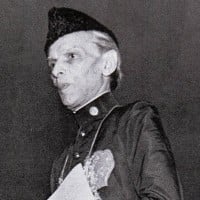 "Quaid-e-Azam" Muhammad Ali Jinnah (December 25th 1876 - September 11th 1948) was a British-Indian lawyer and politician, whom would later go on to become the founder of Pakistan in 1947 and its first Governor-General. He died only a year after from tuberculous, but has remained an influential and important... read more
"Quaid-e-Azam" Muhammad Ali Jinnah (December 25th 1876 - September 11th 1948) was a British-Indian lawyer and politician, whom would later go on to become the founder of Pakistan in 1947 and its first Governor-General. He died only a year after from tuberculous, but has remained an influential and important... read more Gandhi's aim was to protect India from splitting up, while Jinnah's was to provide an autonomous state not only for his nation but also for people oppressed by the staggering Hindu majority. Jinnah's struggle was unique. He did not just lead the Pakistan Movement. His leadership achieved what Islamic Reformers, Mughals, and other influential legends couldn't. That is Jinnah - a victor, indeed. He won the duel against Gandhi. The movement is often summed up as a game of chess between these two. Gandhi was unable to prevent the split of India and lost it to Jinnah.
 Fidel Alejandro Castro Ruz, known as Fidel Castro (August 13, 1926 – November 25, 2016), was a Cuban politician and revolutionary who governed the Republic of Cuba as Prime Minister from 1959 to 1976 and then as President from 1976 to 2008. Politically a Marxist–Leninist and Cuban nationalist, he... read more
Fidel Alejandro Castro Ruz, known as Fidel Castro (August 13, 1926 – November 25, 2016), was a Cuban politician and revolutionary who governed the Republic of Cuba as Prime Minister from 1959 to 1976 and then as President from 1976 to 2008. Politically a Marxist–Leninist and Cuban nationalist, he... read more Anyone who could fight out of the jungle with makeshift arms and overthrow a violent and greedy tyrant, who stood up to the might of the "good guys" for 50 years and who always had the well-being of his people at heart, deserves the accolade of leader of the 20th century. As for his influence, just look at South America in the 21st century. One by one, its nations have cast off the chains of North American imperialism, cloaked as always in a shroud of benevolence and charity.
What legacy did John Paul II leave? He left Ratzinger, a despot, ex-Hitler Youth, misogynist, homophobe, a beacon of hatred, a haven for serial child rapists, a friend to the powerful and corrupt, and a defender of ignorance and poverty. Fidel may have had to make difficult decisions in order to protect his revolution, but they pale in comparison to the magnitude of the horrific crimes against humanity perpetrated by at least six American presidents since he first came to power.
 Ronald Wilson Reagan (1911-2004) was an American politician and actor who was 40th President of the United States from 1981 to 1989 . Prior to his presidency, he was the 33rd Governor of California from 1967 to 1975, following a career as a Hollywood actor and union leader until his death in 2004
Ronald Wilson Reagan (1911-2004) was an American politician and actor who was 40th President of the United States from 1981 to 1989 . Prior to his presidency, he was the 33rd Governor of California from 1967 to 1975, following a career as a Hollywood actor and union leader until his death in 2004 Created all the problems we are dealing with today. His trickle-down economics has created the economic disaster that every Republican President repeats and every Democratic President has to spend their whole term clearing up.
I never voted for him, but I must admit he accomplished everything he promised on the campaign trail. I learned to admire his confidence and action, and that is what leadership is all about.
By escalating the arms race, he brought the Soviet Union to its inevitable end quicker. Through Nancy's War on Drugs, he worsened conditions for those who have addiction problems.
 Bhimrao Ramji Ambedkar (14 April 1891 – 6 December 1956), popularly known as Babasaheb or B. R. Ambedkar, was an Indian jurist, economist, politician and social reformer who inspired the Dalit Buddhist movement and campaigned against social discrimination towards Untouchables (Dalits), while also... read more
Bhimrao Ramji Ambedkar (14 April 1891 – 6 December 1956), popularly known as Babasaheb or B. R. Ambedkar, was an Indian jurist, economist, politician and social reformer who inspired the Dalit Buddhist movement and campaigned against social discrimination towards Untouchables (Dalits), while also... read more An enigmatic personality, brilliant and humble. He could have served other nations for his betterment or converted to Islam or Christianity to gain political influence and power, considering the context of pre-independent India. However, he chose to strive only for his community and the lower levels of Hindu society. He even made reforms in the constitution to benefit every stratum of Indian society, protecting the harmony and integrity of India.
Dr. B.R. Ambedkar is one of the most influential personalities of India. Thanks to his efficient constitution, India managed to preserve its freedom and independence. Starting from a very depressed background, India has now become a strong, well-established, and the world's largest democratic country. Despite having more than a hundred languages, six religions, and various disparities, India is progressing towards greater heights.
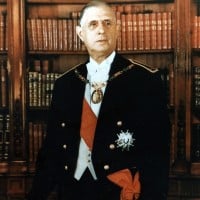 Charles André Joseph Marie de Gaulle (22 November 1890 – 9 November 1970) was a French general and statesman. He was the leader of Free France (1940–44) and the head of the Provisional Government of the French Republic (1944–46). In 1958, he founded the Fifth Republic and was elected as the 18th... read more
Charles André Joseph Marie de Gaulle (22 November 1890 – 9 November 1970) was a French general and statesman. He was the leader of Free France (1940–44) and the head of the Provisional Government of the French Republic (1944–46). In 1958, he founded the Fifth Republic and was elected as the 18th... read more French general and statesman who led the Free French Forces during World War II. He later founded the French Fifth Republic in 1958 and served as its first president from 1959 to 1969.
Should be in the top ten. He restored the nation of France and succeeded after the terrible defeat in June 1940, in getting an occupation zone in Germany, avoiding a civil war, and securing a seat for France at the UN.
He was the leader of the Free French Forces and a true opponent to the Vichy Regime. He played a huge part in decolonization.
 Mao Zedong, also transliterated as Mao Tse-tung and commonly referred to as Chairman Mao, was a Chinese communist revolutionary and founding father of the People's Republic of China, which he governed as Chairman of the Communist Party of China from its establishment in 1949, until his death in 1976... read more
Mao Zedong, also transliterated as Mao Tse-tung and commonly referred to as Chairman Mao, was a Chinese communist revolutionary and founding father of the People's Republic of China, which he governed as Chairman of the Communist Party of China from its establishment in 1949, until his death in 1976... read more Mao Zedong transformed China into what is now known as the People's Republic of China. Through the Great Leap Forward, China is now one of the largest producers of technology-oriented products. It is also one of the worst nations where human rights are concerned. Like many of the leaders on this list, he was a great leader but not a good one.
His gargantuan ego, villainous contempt for the human condition, and role in shaping Southeast Asia earn Mao a spot in the top ten.
If "influential" means causing the deaths of a significant number of civilians, then Mao is your guy.
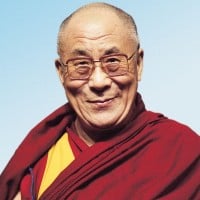 The Dalai Lama is a monk of the Gelug or "Yellow Hat" school of Tibetan Buddhism, the newest of the schools of Tibetan Buddhism founded by Je Tsongkhapa. The Dalai Lama title was created by Altan Khan (Shunyi Wang of China) in 1578. The 14th and current Dalai Lama is Tenzin Gyatso.
The Dalai Lama is a monk of the Gelug or "Yellow Hat" school of Tibetan Buddhism, the newest of the schools of Tibetan Buddhism founded by Je Tsongkhapa. The Dalai Lama title was created by Altan Khan (Shunyi Wang of China) in 1578. The 14th and current Dalai Lama is Tenzin Gyatso. The man is peace incarnate, a life-long leader of Tibet, Buddhism, and Eastern spirituality. Feared by China and loved the world over.
He can't compare to any being in the world. A great spiritual and political leader.
Philosopher, thinker, author, neuroscientist, and a celebrity.
So influential, he had a cartoon character named after him, and a great one at that (it's Avatar: The Last Airbender in case you were wondering).
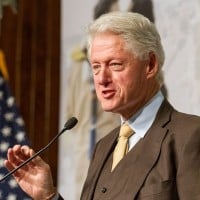 William Jefferson Clinton (Born August 19th 1946) is an American politician who was the 42nd President of the United States. He previously served as governor of Arkansas. He became president after unseating incumbent president George H.W. Bush in 1992. He was re-elected in 1996 after defeating Senator... read more
William Jefferson Clinton (Born August 19th 1946) is an American politician who was the 42nd President of the United States. He previously served as governor of Arkansas. He became president after unseating incumbent president George H.W. Bush in 1992. He was re-elected in 1996 after defeating Senator... read more